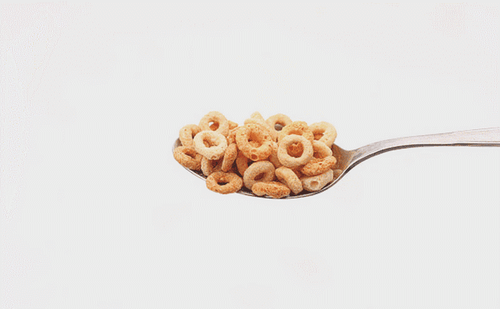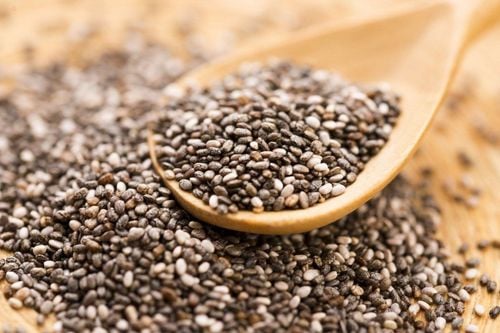This is an automatically translated article.
Everyone knows that chia seeds are small in size and contain many important nutrients. However, if you, overuse or use it improperly, the seeds can cause these side effects. Refer to the article below to know about the benefits as well as understand more about whether drinking chia seeds is harmful?1. Things to know about Chia seeds
Chia seeds are small in size, dark brown in color. The tree itself is considered an herb and grows to about 1m tall. When the flowers have fully bloomed and withered, the chia seeds can be harvested.Chia seeds are arguably the most important part of the plant, the seeds are rich in fatty acids and proteins, each absorbing more than 12 times its weight in water. When water is absorbed, chia seeds create a gel.
2. The great uses of chia seeds
2.1. Chia seeds contain antioxidants One of the top benefits of chia seeds is that they are rich in antioxidants that help our body absorb nutrients better and effectively block damaging free radicals.2.2. Chia seeds are very high in protein In fact, 14% of the weight of chia seeds is made up of protein, as well as essential amino acids, which help our bodies make protein efficiently.
Protein is important for a person's overall health. Protein is important for hair, skin and nail health as well as muscle growth, hormone balance, and weight maintenance.
Low amounts of protein and amino acids in the diet can lead to mood swings, muscle loss, poor concentration and difficulty losing weight. Chia seeds can be an excellent source of plant-based protein.
2.3. Chia Seeds Improve Your Oral Health The vitamins and nutrients found in chia seeds like calcium, iron and zinc are essential for healthy bone and teeth development.
Calcium is not only needed to develop strong teeth and bones, but it also plays an important role in keeping them strong. Not getting enough calcium can lead to weak teeth, which will eventually chip, crack or become infected.
The amount of zinc present in chia seeds will also work to keep your teeth healthy by preventing tartar and plaque build-up. Not only will your teeth be cleaner, but your breath will also smell better.
2.4. Chia seeds are good for heart health Chia seeds are a great supplement that can contribute to heart health. Along with anti-inflammatory properties, chia seeds have also been recognized for their ability to regulate cholesterol levels and lower blood pressure. This is a perfect, heart-healthy snack.
The high amount of omega 3 fatty acids in chia seeds helps your body better absorb essential vitamins like vitamin A, vitamin D and vitamin E. The powerful anti-inflammatory effects of essential fatty acid properties help reduce stress in the body and prevent stress on blood vessels, preventing metabolic cardiovascular disease.
2.5. Chia seeds can promote weight loss Chia seeds contain a large amount of fiber and protein, like oatmeal, their texture causes them to expand and contribute to a feeling of fullness when eaten.
Feeling full early in the meal has been shown to be very effective in preventing overeating and weight gain. If you are looking to increase your fiber intake and provide nutrients to your body, then chia seeds could be the answer for you.

Hạt chia có hại không là thắc mắc của nhiều người
3. The Side Effects of Chia Seeds
“Is it harmful to drink chia seeds?” . In addition to the great benefits of chia seeds, drinking chia seeds can still bring side effects, if you overuse or use them improperly.3.1. Eating too many chia seeds causes digestive problems Chia seeds are a good source of fiber, but too much fiber can have the opposite effect, leading to stomach and gastrointestinal problems.
People who consume too much fiber may experience side effects such as diarrhea, constipation, bloating and flatulence in the intestines.
3.2. Choking hazard Although they are safe for most people, chia seeds can increase the risk of choking. So make sure you consume them carefully.
Always make sure you soak the chia seeds for at least 5-10 minutes before eating. People with difficulty swallowing need to be extra cautious when eating them.
3.3. Chia seeds may contain the wrong type of Omega 3 When it comes to omega-3s, there are three main types: Alpha Lipoic acid (ALA), eicosapentaenoic acid (EPA), and docosahexaenoic acid (DHA). EPA and DHA are the active forms that humans need most, while ALA is the inactive forms that must be converted before the body can use them.
Although omega-3 fatty acids are generally recognized as beneficial for health, several studies have found an association between ALA intake and prostate cancer.
3.4. Chia Seeds Can Lower Blood Pressure Omega-3s found in chia seeds can produce significant anti-inflammatory effects that help lower your blood pressure. For people with high blood pressure, this can be a good thing.
If you already have low blood pressure, lowering your blood pressure further, can thin your blood too much and lead to a number of other health problems like nausea, fainting, blurred vision and even depression
3.5. Chia Seeds Can Cause Allergies Although allergic reactions to chia seeds are rare, it's important to remember that every individual is different and may experience different results when consuming chia seeds.
The high amount of protein found in chia seeds can also be shown to be an allergen. Common symptoms of a chia seed allergy include: Rash, hives, wheezing and, in severe cases, vomiting.
In severe cases, a food allergy can even lead to anaphylaxis, a life-threatening condition that causes difficulty breathing, tightness in the throat and chest.

Nhiều người hỏi uống hạt chia có hại không thì câu trả lời là không bạn nếu biết cách uống
In most cases, eating a moderate amount of chia seeds can help people with diabetes control their blood sugar. However, insulin dosage is individualized and carefully adjusted to prevent drops and spikes in blood sugar. Eating too many chia seeds can cause your blood sugar to drop and may require an adjustment in the dose of your diabetes medication.
3.6.2 Blood Pressure Medication Omega 3 found in chia seeds have been shown to thin the blood and can lower blood pressure. Chia seeds may enhance the action of blood pressure medications, which can lead to hypotension, or low blood pressure.
To limit the side effects from the seeds have not yet caused. Start with 1 ounce (28 grams) of chia seeds per day and assess your tolerance before increasing your intake slowly. Also, drink enough water as you increase your fiber intake, and soak chia seeds for 5-10 minutes before eating. And if you experience any negative symptoms after eating chia seeds, stop eating and consult a healthcare professional.
Chia seeds contain many essential vitamins and nutrients that our bodies need to stay healthy and happy! While there's no denying that these tiny seeds are a superfood, the health benefits of chia seeds vary widely and won't be the same for everyone.
Please dial HOTLINE for more information or register for an appointment HERE. Download MyVinmec app to make appointments faster and to manage your bookings easily.
References: Bobsredmill.com, Healthline.com












